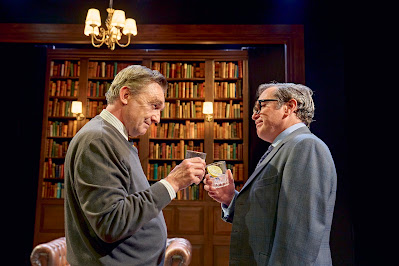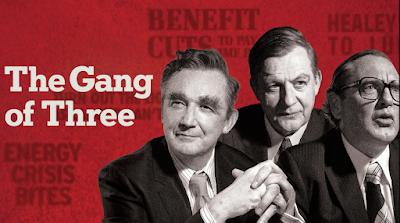Oh, I wouldn’t worry too much about Sunny Jim, far too common to be a leader…
It’s now a truism that all political lives end in failure although over recent years we’ve seen more than enough profiting healthily in that state but in the midst of that life we are always so close to death with the knife hovering close to the backs of even the best of friends.
Events open with The Who’s Won’t Get Fooled Again as we join old Oxford and political allies Anthony Crossland (Alan Cox) and Roy Jenkins (Hywel Morgan) meeting at the latter’s house after he has just resigned, on principal, as Labour Party Deputy Leader. Tony senses an opportunity here and wants Roy to support his bid to take over in that position but, as we are to discover, these two have much that divides them as well as the vast amount they have in common.
Robert Khan and Tom Saliinsky’s new political drama gets
us inside the head of these key players at a time of possibility and danger for
the Labour Party. Then they had failed to get a third term for Harold Wilson as
Ted Heath took the Tories to victory and then, against the odds, they bounced
back in 1974 with a win that Jenkins describes as both unlikely and unlucky:
Labour was left with an economic time-bomb as well as unruly industrial
relations and a Conservative Party starting to define itself around the
monetarist purity of Mrs Margaret Thatcher.
The play gets to grips with the anxieties at the heart of Labour’s top team as three moderates fail to form an alliance that might have fended off Thatcher and the subsequent splintering of the party with Jenkin’s departure to form the Social Democratic Party with Roy Rogers, Shirley Williams and David Owen, as the left wing took over with the Tony Benn supporting Michael Foot into power leaving the party in opposition for the longest time since its 1945 landslide.
 |
| Hywell Morgan and Alan Cox - photographer Manuel Harlan |
Do we tend to lionise former politicians or do we just long for a time when they were more driven by principals and less concerned with sound bites and social media. Writing in the programme, Steve Richards, explains the conditions of the time which were much more conducive to a broad church which allowed debate and lengthy careers to flourish with Jenkins, Healey and Crossland all having served in Wilson’s governments in the sixties and before that Gaitskell in opposition. Crossland’s book, The Future of Socialism (1956) is made the butt of a few jokes here – it’s a framework that supports analysis in any era… not out of date! – is still a key text for the likes of Gordon Brown and Ed Miliband.
In the play the men are combative and friendly in moments
that only occasionally hit the future nail on the head too hard… we’re subsumed
in a time of more intellectual debate over possibilities that may never end – a
polite civil war involving egos and views of Europe, nationalisation and the
balance of payments. There’s love behind the barbs with Tony celebrating Roy’s
legalisation of homosexuality and abortion: “you were the bespectacled
Father of the Age of Aquarius!” – these men have achieved things but maybe
they’re out of ideas when all they want is more power?
Thus, it is that these two friends and a third, from the year above them at Oxford, Dennis Healey (Colin Tierney) play games over the years as fortunes shift and the game slips away as the left with Benn and Foot seemingly making the deal their centrist colleagues couldn’t bring themselves to agree as the popular vote shifted decisively through The Winter of Discontent, and the book balancing resisted so forcibly by the Trade Unions.
The play makes light work of the history and, assumptions there may be aplenty, but they are informed and help to map out the chemistry that combined with circumstance to consign this Labour generation – 12 years in government out of the previous 16 – to opposition for the next 18. It’s not so much how it happened as who it happened to and the characterisations are rich of these three brilliant minds. I can’t see a Reeves, Streeting and Kendall version working quite so well… but then maybe all political lives are revived by the distancing of time?
 |
| Colin Tierney and Hywel Morgan - Photographer Manuel Harlan |
In these days when there is no longer a “natural party of
government”, we see the delusional certainties that make the trio miss out on
history with Healey playing games with the IMF and his party and Jenkins driven
by principle and privilege and Crossland perhaps wrong-footed by the gifts that
came too easily.
IThankYou Theatre rating: **** The political theatre of the recent past makes for a gripping analysis of our politics today; history does not so much repeat itself as continue on the same lines evolving around the same issues and divisions with the added spite of social media and new forms of communication.
Alan Cox is a very plausible Tony Crosland full of charm and wit with his old Oxford edge over Jenkins still informing their relationship, a friendship somewhat deeper than I had imagined. Hywel Morgan’s “Woy” is a man of destiny yet still full of insecurity and a guile whilst Colin Tierney’s assured old Mertonian is the true heavyweight just lacking the charm and the destiny… perhaps all three together would have made the perfect leader?
Kirsty Patrick Ward directs and creates a compelling world of political intrigue, the potential and the quite desperation of ‘70s Britain only a few dozen metres below the streets of 21st Century Islington former home of King Tony and the young man with the scruffy beard who used to hang on Tony Benn’s every word…
Robert Khan and Tom Salinsky have previously written the acclaimed play on Brexit, as well as other political works Coalition, Kingmaker and Impossible. Their attention to detail is fabulous and their wit hits home throughout, I look forward to Truss: How I Won the War!
The Gang of Three plays at the Kings Head Theatre until 1st June and you can buy tickets directly from their website here!
All photographs by Manuel Harlan

